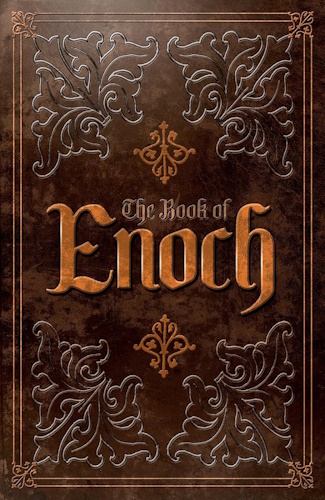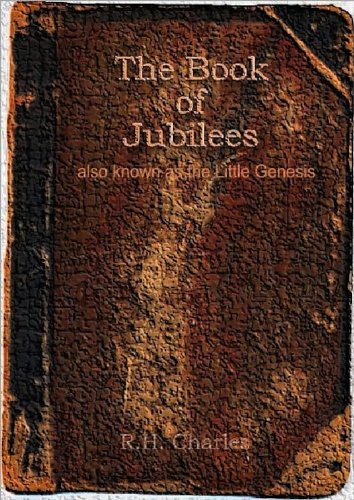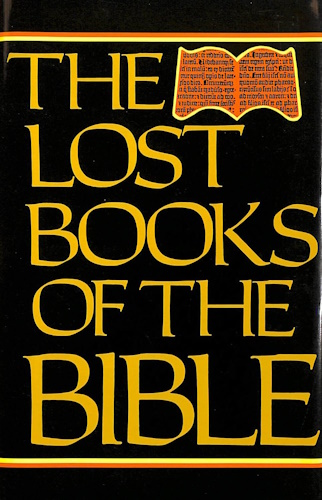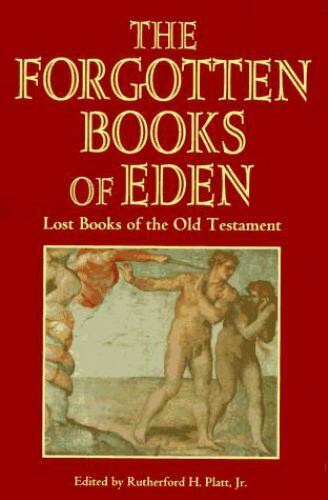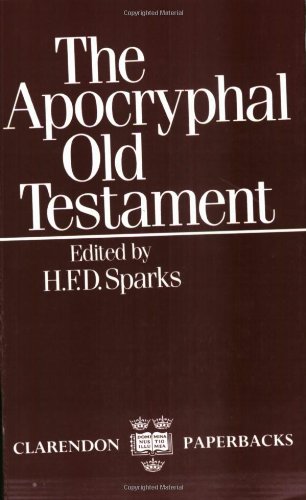
TABLE OF CONTENTS
Old Testament Apocrypha - The Apocrypha Proper of the non-Canonical Jewish literature from 200 B.C. to A.D. 100 constitutes the excess of the Vulgate over the Hebrew Old Testament, which excess was in turn borrowed from the LXX. But this listing follows The Apocrypha and Pseudepigrapha of the old Testament in English, Volume i, Apocrypha edited by R.H. Charles and differs from the Apocrypha Proper at once in the way of excess and in the way of defect. 3 Maccabees has been added after 2 Maccabees, since it is contained in many MSS. of the LXX, and 4 Ezra has been transferred to Volume ii, Pseudepigrapha, since it is essentially a Pseudepigraph.
How the term 'Apocryphal Books' arose has not yet been determined. It did not, as Zahn (Gcscli. dcs Nciitcstamcntlichen Kaiioiis I. i. 123 sq.), Schurer, Porter, N. Schmidt, and others maintain, originate in the Late Hebrew phrase designating 'hidden books.' But Talmudic literature knows nothing of such a class. The Hebrew word ganaz does not mean 'to hide', but 'to store away' things in themselves precious. Indeed, so far is it from being a technical term in reference to non-Canonical writings, that it is most frequently used in reference to the Canonical Scriptures themselves. When writings were wholly without the pale of the Sacred books — such as those of the heretics or Samaritans — they were usually designated hisonim, i.e. 'outside' (Sanh. x. i).
The term "apocrypha" comes from the Greek word meaning "hidden" or "secret." Originally, the term was applied to sacred books whose contents were too exalted to be made available to the general public. Gradually, the term "apocrypha" took on a disparaging connotation, since the orthodoxy of these hidden books was often questionable.
Deuterocanonical is a term first coined in 1566 by the theologian Sixtus of Siena to describe scriptural texts of the Old Testament whose canonicity was explicitly defined for Catholics by the Council of Trent. Their acceptance among early Christians was not universal, but regional councils in the West published official canons that included these books as early as the fourth and fifth centuries.
The Catholic deuterocanonical scriptural texts as defined by the Council of Trent follow the listing in The New English Bible except for 3 Maccabees and 4 Ezra as noted above for this listing.
THE APOCRYPHA OF THE OLD TESTAMENT
- Historical Books
- The First Book of Esdras (Cook)
- The First Book of the Maccabees (Oesterley)
- The Second Book of the Maccabees (Moffatt)
- The Third Book of Maccabees (Emmet)
- Quasi-Historical Books Written With A Moral Purpose
- Wisdom Literature
- Ecclesiaticus or the Wisdom of Jesus son of Sirach (Box and Oesterley)
- The Wisdom of Solomon (Holmes)
- Additions To And Completions Of The Canonical Books
- 1 Baruch (Whitehouse)
- A Letter of Jeremiah (Ball)
- The Prayer of Manasseh
- Additions to Daniel:
- The Song of the Three (Bennett)
- Daniel and Susanna (Kay)
- The Idol Bel and the Dragon (Witton Davies)
- Additions to Esther:
- The Rest of the Chapters of the Book of Ester
Pseudepigrapha - [Gr.,=things falsely ascribed], meaning "books with false titles," refers to books similar in type to those of the Bible whose authors gave them the names of persons of a much earlier period in order to enhance their authority. The Pseudepigrapha is a collection of early Jewish and some Jewish-Christian writings composed between c.200 B.C. and c.A.D. 200, not found in the Bible or rabbinic writings.
The first listing follows The Apocrypha and Pseudepigrapha of the old Testament in English, Volume ii, Pseudepigrapha edited by R.H. Charles:
- Primitive History Rewritten From The Standpoint Of The Law
- The Book of Jubilees (Charles)
- Sacred Legends
- The Letter of Aristeas (Andrews)
- The Books OF Adam and Eve (Wells)
- The First Book of Adam and Eve (Rutherford H. Platt, Jr.)
- The Second Book of Adam and Eve (Rutherford H. Platt, Jr.)
- The Life of Adam and Eve (Charles)
- Slavonic Life of Adam and Eve (Charles)
- The Ascension of Isaiah
- The Martyrdom of Isaiah i-v 14 (Charles)
- The Vision of Isaiah vi—-xi 40
- The Testament of Hezekiah ii 13 b—iv 18
- Apocalypses
- Book of Enoch (1 Enoch) (Charles)
- 1 Enoch - a side by side composite of R. H. Charles, Richard Laurence and others
- The Testaments of the Twelve Patriarchs (Charles)
- I. The Testament of Reuben Concerning Thoughts
- II. The Testament of Simeon Concerning Envy
- III. The Testament of Levi Concerning the Priesthood and Arrogance
- IV. The Testament of Judah Concerning Fortitude, and Love of Money, and Fornication
- V. The Testament of Issachar Concerning Simplicity
- VI. The Testament of Zebulun Concerning Compassion and Mercy
- VII. The Testament of Dan Concerning Anger and Lying
- VIII. The Testament of Naphtali Concerning Natural Goodness
- IX. The Testament of Gad Concerning Hatred
- X. The Testament of Asher Concerning Two Faces of Vice and Virtue
- XI. The Testament of Joseph Concerning Sobriety
- XII. The Testament of Benjamin Concerning a Pure Mind
- The Sibylline Oracles (Milton S. Terry)
- The Assumption of Moses (Charles)
- 2 Enoch, or The Book of the Secrets of Enoch (Forbes and Charles)
- The Book Of The Apocalypse Of Baruch The Son Of Neriah
(2 Baruch) Syraiac (Charles) - The Greek Apocalypse of Baruch (3 Baruch) (Hughes)
- The Second Book of Esdras (4 Ezra) (Box)
- Book of Enoch (1 Enoch) (Charles)
- Psalms
- The Psalms of Solomon (Gray)
- Ethics and Wisdom Literature
- The Fourth Book of Maccabees (Townshend)
- Pirke Aboth or Sayings Of The Fathers (Herford)
- The Story of Ahikar (Harris, Lewis, Conybeare)
- History
The End of the works included in The Apocrypha and Pseudepigrapha of the old Testament in English, Volume i & ii edited by R.H. Charles
In the Preface of The Apocryphal Old Testament edited by H.F.D. Sparks published 1984, Clarendon Press, Mr. Sparks addresses the 'Pseudepigrapha' issue with these words: "And finally, the term 'Pseudepigrapha' has been avoided altogether. Pseudepigrapha is, in any case, an ugly word. And when used in association with 'Apocrypha', as it so frequently is, it can be very misleading. Strictly it is 'a collective term for books or writings bearing a false title, or ascribed to another than the true author'. Many of the books commonly grouped together and alluded to as 'the Pseudepigrapha' are indeed pseudepigraphical — no doubt a majority. But there is nothing distinctive about this: there are pseudepigraphical books in the Apocrypha (e.g. The wisdom of Solomon), and there are pseudepigraphical books in the Old Testament itself (e.g. Daniel). To refer to 'the Pseudepigrapha', without further definition or qualification, creates the impression in the popular mind that alongside the 'canonical' Old Testament and the 'deutero-canonical' Apocrypha there is a third, universally recognized, 'trito-canonical' collection of books — when there is not. Any collection of books of this kind, however chosen, is bound to mirror the predilections and the prejudices of its editor(s); and it is well that this should be realized. The term therefore, though ancient, is best avoided."
This second list follows The Apocryphal Old Testament edited by H.F.D. Sparks published 1984, Clarendon Press:
The Apocryphal Old Testament
- Jubilees (R.H. Charles revised by C. Rabin)
- The Life of Adam and Eve (L.S.A. Wells revised by M. Whittaker)
- Book of Enoch (1 Enoch) (M.A. Knibb)
- The Book of the Secrets of Enoch (2 Enoch) (A. Pennington)
- The Apocalypse of Abraham (A. Pennington)
- The Testament of Abraham (N. Turner)
- The Testament of Isaac (K.H. Kuhn)
- The Testament of Jacob (K.H. Kuhn)
- The Ladder of Jacob (A. Pennington)
- Joseph and Aseneth (D. Cook)
- The Testaments Of The Twelve Patriarchs (M. DeJonge)
- The Assumption of Moses (R.H. Charles revised by J.P.M. Sweet)
- The Testament of Job (R. Thornhill)
- The Psalms of Solomon (S.P. Brock)
- The Odes of Solomon (J.A. Emerton)
- The Testament of Solomon (M. Whittaker)
- The Apocalypse of Elijah (K.H. Kuhn)
- The Ascension of Isaiah (R.H. Charles revised by J.M.T. Barton)
- The Paraleipomena of Jeremiah (4 Baruch) (R. Thornhill)
- The Syraiac Apocalypse of Baruch (2 Baruch) (R.H. Charles revised by L.H. Brockington)
- The Greek Apocalypse of Baruch (3 Baruch) (H.M.Hughes revised by A.W. Argyle)
- The Apocalypse of Zephaniah and An Anonymous Apocalypse (K.H.Kuhn)
- The Apocalypse of Esdras (R.J.H. Shutt)
- The Vision of Esdras (R.J.H. Shutt)
- The Apocalypse of Sedrach (R.J.H. Shutt)
The End of the works included in The Apocryphal Old Testament edited by H.F.D. Sparks published 1984, Clarendon Press.
- Other Old Testament Non-Canonical Books
- Non-deuterocanonical Old Testament Apocrypha
![]()
![]()
-
Urantia Book, 44:0.11 - The Celestial Artisans
Never in your long ascendancy will you lose the power to recognize your associates of former existences. Always, as you ascend inward in the scale of life, will you retain the ability to recognize and fraternize with the fellow beings of your previous and lower levels of experience. Each new translation or resurrection will add one more group of spirit beings to your vision range without in the least depriving you of the ability to recognize your friends and fellows of former estates.
-
Princess Bride 1987 Wallace Shawn (Vizzini) and Mandy Patinkin (Inigo Montoya)
Vizzini: HE DIDN'T FALL? INCONCEIVABLE.
Inigo Montoya: You keep using that word. I do not think it means what you think it means. -
Urantia Book, 117:4.14 - The Finite God
And here is mystery: The more closely man approaches God through love, the greater the reality -- actuality -- of that man. The more man withdraws from God, the more nearly he approaches nonreality -- cessation of existence. When man consecrates his will to the doing of the Father's will, when man gives God all that he has, then does God make that man more than he is.
-
Urantia Book, 167:7.4 - The Talk About Angels
"And do you not remember that I said to you once before that, if you had your spiritual eyes anointed, you would then see the heavens opened and behold the angels of God ascending and descending? It is by the ministry of the angels that one world may be kept in touch with other worlds, for have I not repeatedly told you that I have other sheep not of this fold?"
-
Urantia Book, Foreword - 0:12.12 - The Trinities
But we know that there dwells within the human mind a fragment of God, and that there sojourns with the human soul the Spirit of Truth; and we further know that these spirit forces conspire to enable material man to grasp the reality of spiritual values and to comprehend the philosophy of universe meanings. But even more certainly we know that these spirits of the Divine Presence are able to assist man in the spiritual appropriation of all truth contributory to the enhancement of the ever-progressing reality of personal religious experience—God-consciousness.
-
Urantia Book, 1:4.3 - The Mystery Of God
When you are through down here, when your course has been run in temporary form on earth, when your trial trip in the flesh is finished, when the dust that composes the mortal tabernacle "returns to the earth whence it came"; then, it is revealed, the indwelling "Spirit shall return to God who gave it." There sojourns within each moral being of this planet a fragment of God, a part and parcel of divinity. It is not yet yours by right of possession, but it is designedly intended to be one with you if you survive the mortal existence.
-
Urantia Book, 1:4.1 - The Mystery Of God
And the greatest of all the unfathomable mysteries of God is the phenomenon of the divine indwelling of mortal minds. The manner in which the Universal Father sojourns with the creatures of time is the most profound of all universe mysteries; the divine presence in the mind of man is the mystery of mysteries.
-
Urantia Book, 1:4.6 - The Mystery Of God
To every spirit being and to every mortal creature in every sphere and on every world of the universe of universes, the Universal Father reveals all of his gracious and divine self that can be discerned or comprehended by such spirit beings and by such mortal creatures. God is no respecter of persons, either spiritual or material. The divine presence which any child of the universe enjoys at any given moment is limited only by the capacity of such a creature to receive and to discern the spirit actualities of the supermaterial world.
-
Urantia Book, 11:0.1 - The Eternal Isle Of Paradise
Paradise is the eternal center of the universe of universes and the abiding place of the Universal Father, the Eternal Son, the Infinite Spirit, and their divine co-ordinates and associates. This central Isle is the most gigantic organized body of cosmic reality in all the master universe. Paradise is a material sphere as well as a spiritual abode. All of the intelligent creation of the Universal Father is domiciled on material abodes; hence must the absolute controlling center also be material, literal. And again it should be reiterated that spirit things and spiritual beings are real.
-
Urantia Book, 50:6.4 - Planetary Culture
Culture presupposes quality of mind; culture cannot be enhanced unless mind is elevated. Superior intellect will seek a noble culture and find some way to attain such a goal. Inferior minds will spurn the highest culture even when presented to them ready-made.
-
Urantia Book, 54:1.6 - True And False Liberty
True liberty is the associate of genuine self-respect; false liberty is the consort of self-admiration. True liberty is the fruit of self-control; false liberty, the assumption of self-assertion. Self-control leads to altruistic service; self-admiration tends towards the exploitation of others for the selfish aggrandizement of such a mistaken individual as is willing to sacrifice righteous attainment for the sake of possessing unjust power over his fellow beings.
-
Urantia Book, 54:1.9 - True And False Liberty
How dare the self-willed creature encroach upon the rights of his fellows in the name of personal liberty when the Supreme Rulers of the universe stand back in merciful respect for these prerogatives of will and potentials of personality! No being, in the exercise of his supposed personal liberty, has a right to deprive any other being of those privileges of existence conferred by the Creators and duly respected by all their loyal associates, subordinates, and subjects.
-
Urantia Book, 54:1.8 - True And False Liberty
There is no error greater than that species of self-deception which leads intelligent beings to crave the exercise of power over other beings for the purpose of depriving these persons of their natural liberties. The golden rule of human fairness cries out against all such fraud, unfairness, selfishness, and unrighteousness.





